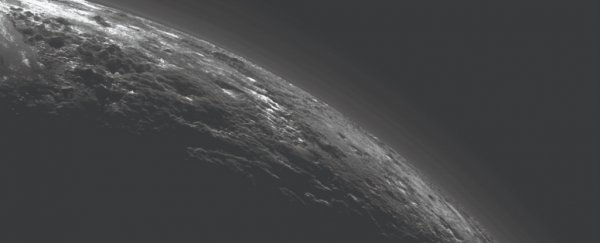Saturday 24 August 2019 marked a vexing anniversary for planetary scientists. It was 13 years to the day that Pluto's official definition changed - what was once numbered among the planets of the Solar System was now but a humble dwarf planet.
But not everyone agreed with the International Astronomical Union's ruling - and now NASA Administrator Jim Bridenstine has added his voice to the chorus declaring support for Pluto's membership in the Solar System Planet Club.
"Just so you know, in my view, Pluto is a planet," he said during a tour of the Aerospace Engineering Sciences Building at the University of Colorado Boulder.
"You can write that the NASA Administrator declared Pluto a planet once again. I'm sticking by that, it's the way I learnt it, and I'm committed to it."
My favorite soundbyte of the day that probably won't make it to TV. It came from NASA Administrator Jim Bridenstine. As a Pluto Supporter, I really appreciated this. #9wx #PlutoLoversRejoice @JimBridenstine pic.twitter.com/NdfQWW5PSZ
— Cory Reppenhagen (@CReppWx) August 23, 2019
Now, this doesn't officially change anything, and his reasoning is a little facile - having learnt something one way doesn't mean it has to stay that way, thank you geocentrism. It's an off-the-cuff lighthearted remark, and that's fine.
But it just so happens that planetary scientists have been banging the Pluto planet drum for years, and their reasons are a little more considered. Actually, a lot more.
When the IAU removed Pluto from the list of what had been nine planets in the Solar System in August 2006, the move was a corollary of its official definitions of planets and dwarf planets.
Before that, there had been no official definitions of these objects, which created problems when astronomer Mike Brown of the California Institute of Technology and colleagues discovered an object that seemed to be bigger than Pluto. (This object was later designated a dwarf planet, and named Eris, after the Greek goddess of strife and discord.)
The difference between a planet and a dwarf planet that changed Pluto's status? Pluto - hanging out as it does in the Kuiper Belt asteroid field - has not cleared "the neighbourhood around its orbit" of other rocks.
This helped to resolve the perceived problem of other objects around the same size of Pluto, of which there are potentially hundreds. If Pluto was in the planet club, what was keeping the rest of the riff-raff out?
Planetary scientist Alan Stern, leader of NASA's New Horizon's mission, has been vocal about his disappointment with the decision to de-planet Pluto since it was made.
"My conclusion is that the IAU definition is not only unworkable and unteachable, but so scientifically flawed and internally contradictory that it cannot be strongly defended against claims of scientific sloppiness, "ir-rigor," and cogent classification," he wrote in September 2006.
"The New Horizons project, like a growing number of the public, and many hundreds if not thousands of professional research astronomers and planetary scientists, will not recognise the IAU's planet definition resolution of Aug. 24, 2006."
And so he has not. In fact, earlier this year, he debated Ron Ekers of the IAU, defending Pluto's planet status.
It's not just that only 424 of around 9,000 IAU members voted on the resolution, nor that hundreds of planetary scientists immediately petitioned against it.
It's also that Pluto has its own multilayered atmosphere, organic compounds, weather, moons.
It has landscapes - rocky mountain ranges and wide plains. It has avalanches, maybe plutoquakes, maybe even liquid oceans. And that the definition based on orbital clearing has no historical merit.
And even if it did, one could argue that other planets haven't cleared their neighbourhoods either - there are a lot of asteroids hanging around both Earth and Jupiter's orbits (although not nearly as many as the Kuiper Belt.)
Scientists last year argued that a planet should be defined as an object that has become large enough to become a sphere.
"It turns out this is an important milestone in the evolution of a planetary body, because apparently when it happens, it initiates active geology in the body," explained planetary physicist Philip Metzger of the University of Central Florida.
So far, the IAU has shown no signs of backing down, but neither do Pluto's supporters. Perhaps Bridenstine joining Team Pluto will renew the fight. And we, for one, stand by to welcome our hundreds of new planetary pals.
